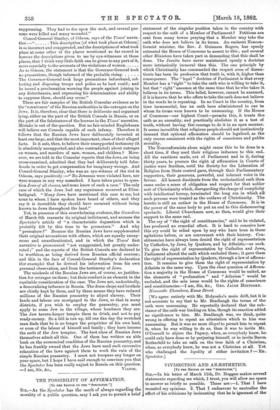THE POSSIBILITY OF AFFIRMATION.
THE EDITOR OF THE " $PECTATOR.1
8113,—As the Spectator has the merit of always regarding the morality of a public question, may I ask you to permit a brief
statement of the singular position taken in the country with respect to the oath of a Member of Parliament ? Petitions are sent from many towns praying that a Member may take the oath who does not believe in its terms. An eminent Noncon- formist minister, the Rev. J. Guinness Rogers, has openly entreated the House of Commons to assent to this ; and several other Ministers have taken part in demanding that this shall be done. The Jesuits have never maintained openly a doctrine more intrinsically immoral than this. The one principle by which Christianity has commanded the respect even of dissen- tients has been its profession that truth is, with it, higher than consequence. The " legal " doctrine of Parliament is that every Member has a "right" to take the oath who is willing to take it,„ but that " right " assumes at the same time that he who takes it believes in its terms. This belief, however, cannot be assumed, if it is known that he who offers to take the oath does not believe in the words he is repeating. In no Court in the country, from time immemorial, has an oath been administered to one to whom its terms were known to be unmeaning. If the House of Commons—our highest Court—permits this, it treats the oath as an unreality, and practically abolishes it as a test of truth, without having thin courage to do it in an open manner.. It seems incredible that religious people should not instinctively demand that optional affirmation should be legalised, as the only course consistent with the rights of conscience and publics morality.
The Nonconformists alone might cause this to be done in a_ short time, if they used their religions influence to this end.. All the exertions made, out of Parliament and in it, during- thirty years, to procure the right of affirmation in Courts of justice were fruitless, until the Society for the Liberation of Religion from State control gave, through their Parliamentary supporters, their generous, powerful, and tolerant voice in its- favour. All honest dissidents from the ecclesiastical oath then came under a sense of obligation and respect for that nobler- sort of Christianity which, disregarding the charge of complicity with intellectual heresy, terminated the long era in which all such persons were treated as the outlaws of Christianity. The heretic is still an outlaw in the House of Commons. It is in the power of the same body to put an end to this dishonouring spectacle. Liberal Churchmen now, as then, would give their- support to the same end.
The cry of "the right of constituencies," said to be violated,. has produced no remedial effect. It is hard to conceive how this cry could be relied upon by any who have been in these agitations before, or are conversant with their history. Con- stituencies have always been denied the right of representation by Catholics, by Jews, by Quakers, and by Atheists,—as such. To give the right of representation by Catholics and Jews,. Parliament altered the oath which excluded them ; it gave them the right of representation by Quakers, through a law of affirma- tion. It remains to give them the right of representation by Atheists in the same way. -Upon the clear question of Affirma- tion a majority in the House of Commons would be united, as, the elements of " profanation " and " Atheism " would be excluded, and the sole issue would be the rights of conscience and constituencies.—I am, Sir, &c., Gao. JACOB HOLYOASZ.
Newcastle Chambers, Essex Street.
[We agree entirely with Mr. Holyoake's main drift, but it ifs not accurate to say that to Mr. Bradlangh the terms of the oath were unmeaning. He repeatedly declared that the sub- stance of the oath was binding on him, though its sanction added. no significance to him. Mr. Bracllangh was, we think, quite wrong in offering to repeat an attestation which to him was. unmeaning. But it was no more illegal to permit him to repeat it, when he was willing to do so, than it was to invite Mr. O'Connell to abjure the Papacy, when, as everybody knew, he could only have done so by perjuring himself, or to invite Baron. Rothschild to take an oath on the true faith of a Christian,. when, as everybody knew, he was not a Christian at all. Yet who challenged the legality of either invitation P — En._ Spectator.]


































 Previous page
Previous page